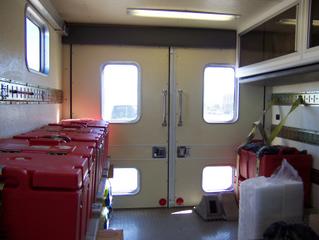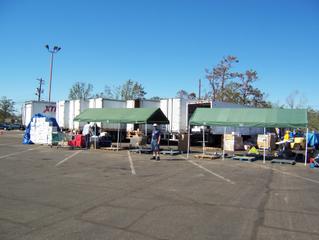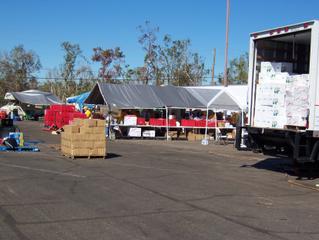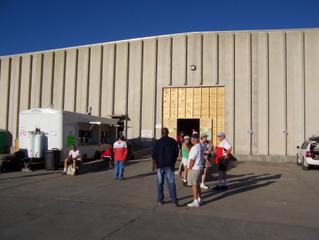Exit Interview with myself
- There is a family of dolphins on the Seabee base that I finally went to go visit. Their story was pretty remarkable. They were a group of 8 trained dolphins that had their
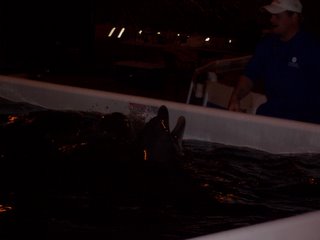 marina flooded during the storm surge, putting them out to sea. Being domesticated, they were sitting ducks out in the open water so there was a frantic search during the days following. Sure enough, a search team found them all together with minimal injuries. They are currently being kept in what seems like really cramped conditions in 5-foot deep pools on the base premises, but I think that they looked pretty happy. Their trainers seem pretty nice.
marina flooded during the storm surge, putting them out to sea. Being domesticated, they were sitting ducks out in the open water so there was a frantic search during the days following. Sure enough, a search team found them all together with minimal injuries. They are currently being kept in what seems like really cramped conditions in 5-foot deep pools on the base premises, but I think that they looked pretty happy. Their trainers seem pretty nice. - Along with Red Cross volunteers, there is a group of Scientologists staying at the shelter. I finally approached one and asked the "volunteer minister" about why they were in MS. She said that the Scientologists believe their religion has something to offer people who have recently been involved in highly traumatic situations, like Katrina. Their "technology", called Dianetics, is supposed to be an effective way to cope with the mental shock. I further engaged her in the basis of Scientology and tried to get at what the religion was all about. My conclusion was that it was it was a complete clone of Hinduism. There didn't seem to me any unique aspect to its teachings. One of the books talked about how Scientology was influenced by the teachings of the Vedas, but it was a better solution to the problems of the "rampantpoverty" in India that Buddha later attempted to eliminate by "civilizing the continent". A bunch of balderash. I didn't really want to get into it with the lady so I just left her telling her that the only difference I could see was in the name.
Q: What did I learn from this experience?
Several things:
- I don't like blogging
In general, I'm torn between defining this blog as an online diary and a dry timeline of my life. Neither is that appealling to me, so until I find a balance I'm discontinuing this blog.
2. I am weak, weak, weak...
...mentally and spiritually. This experience has exposed so many of my deficiencies, which I don't care to elaborate on here. I'm plenty aware of them, and that's all that matters. I feel that I have so much room for improvement, especially in terms of my approach to giving. I haven't cultivated the ability to give with a pure heart, and thus I still have an empty feeling after this act of service. Right before I left, I tried a couple other experiements in giving to see how I felt. I tried to pull the Nipun-like "give away all the money in my wallet" act, but I couldn't find anyone who would accept the money (about $80, and I had to give it indirectly by asking other volunteers to find a worthy cause to put the money towards, since I wasn't going back out to the field). Next I spontaneously gave a way a bunch of clothes I had brought on the trip (including a few items I was particularly attached with) to a volunteer friend who was working at a Red Cross shelter that was trying to gather some supplies for its residents. I could lie and say it made me feel the joy of oneness with humanity, but it really didn't.
Probably the single greatest inspiration in my adult life has been the teachings of Swami Vivekananda. I have the 8 volume set of his complete works, but it was taken me a year (and counting) to put down just the first volume. His message just really resonates with me, and I find myself reading a chapter, thinking about it for a few days or even weeks, then going back and re-reading, etc. Just a very deep message. Anyway, after bittersweet experiences such as this I am always buyoed by his message:
"Freedom is never reached by the weak. Throw away all weakness. Tell your body that it is strong, tell your mind that it is strong, and have unbounded faith and hope in yourself."
"To succeed, you must have tremendous perseverence, tremendous will. 'I will drink the ocean' says the persevering soul, 'At my will mountains will crumble up'. Have that sort of energy, that sort of will, work hard, and you will reach your goal."
3. People in the South need sustained aid.
I've mentioned it in a previous post, but people here are just plain poor. Hurricane or not, they need help. Driving back to the kitchen from our run one night, Jo said something interesting: this place has been struggling since the South lost the Civil War. You can trace their plight to the 19th century, when their economy was entirely dependent on slave labor. Since then they've been behind the rest of the country in terms of creating economy and have never caught up. For example, I still have little idea of what people did for work around Bay St. Louis. My best guess is that they worked in the tourism industry at the casinos. But there is no real opportunity here. This year I got to know a new area in Computer Science research: IT for developing regions, which targets rural areas in third world countries. After visiting MS, I think there needs to be IT for developing (United) States too.
Q: Do you think you made a difference here?
A: Honestly, not really. My work wasn't critical... The operation would have carried on fine without me.
Q: In what ways could Red Cross ops improve?
A: There were a lot of things I had a problem with in the way the operation was run. You would be a fool to come here and see what's going on and not be a little concerned with the inefficiencies and misjudgements. I will say to RC's defense, though, that disaster relief in this magnitude is a very difficult undertaking, and I commend them for all of the work that has been done. Clearly they are providing essential aid for many people, and more than that extending a hand of compassion to people who have seen more hard times than most in this country.
I think the deepest problem is the attitudes of the volunteers. In general the spirit is not selfless, it's selfish. People are grumpy, they fight and argue, talk behind backs, complain about this and that including the clients, charge up unnecessary personal conviniences on the free Red Cross debit card, etc. People forget what they're here for, which is to serve. The pure spirit of service is just lost. People are all good hearted and they should be commended for their efforts, but they are expecting something in return which taints the whole act. I believe this is an unsolvable problem for the RC. They are too big and rigid an organization to influence the attitutdes in a uniform and lasting way of all its volunteers.
Q: What's next for me?
A: Easy. I've had an intention of going on Vipassana mediation retreat for some time now. Hopefully this winter.









